现在完成时的用法及练习题
英语现在完成时的用法及答案

英语现在完成时的用法及答案一、选择题1.—The fashion show will begin in half an hour, but Sandy hasn't turned up yet.—Don't worry. I________ her and she's sure to be here soon.A.will call B.have called C.am calling D.call2.Gina can’t go to the farm with her classmates be cause she________ a bad cold.A.is caught B.is catching C.will catch D.has caught 3.The train ________ for twenty minutes.A.left B.has left C.has been away D.is leaving 4.—When did Suning Plaza in Xuzhou open?—It ________ for over three years.A.opened B.has been open C.was opened D.had been open 5.—May I borrow your new-bought book The Adventures of Tom Sawyer now?—I'm afraid not. I ________ only half of it, and I'll try to finish it this weekend.A.read B.am reading C.have read D.will read 6.Though Tom _______ America for over two years, he misses his friends and relatives from time to time.A.was away from B.left C.has been away from D.has left 7.—Will your cousin go to Guiyang for the summer holiday?—In fact, he ________ Guiyang since he graduated.A.has gone to B.has been to C.has been in D.went to8.It is 4:30p. m. Ben and Leon _______their work, so they are playing chess now. A.finish B.were finishing C.have finished D.will finish 9.Sarah is only 15 years old, but she ________ the Tennis Club for three years.A.joined B.has joined C.has been in D.was 10.—When did you buy your car? It looks so new.—Really? I ________ it for three years and I like it very much.A.have bought B.have had C.bought D.had11.Both his parents look sad. Maybe they _________ what's happened to him.A.will know B.know C.have known D.are knowing 12.—What do you think of the latest 5G smart phone?— It's amazing. It is the most wonderful phone I ________.A.used B.will use C.was using D.have used 13.— Would you like to see the film The Wondering Earth with me?—I’m sorry I __________it twice.A.see B.have seen C.am seeing D.saw 14.—Mum, I want to watch the news about our school. Change the channel, please!—What a pity! It is eight o'clock now. It___________ for a while.A.has been over B.was over C.has finished D.finished 15.―Olivia, are you sure your aunt ________back from America?―Yes. My mom told me. I'm going to see her now.A.had come B.came C.is coming D.has come 16.Mary said that she________ to Yangzhou.A.has never gone B.had never gone C.has never been D.had never been 17.For nearly 100 years, the heartbroken Little Mermaid ________on a rock looking out over Copenhagen's port.A.will sit B.sits C.sat D.has sat18.— Mum, where's my packed lunch? —In the kitchen. I ________ you two sandwiches. A.make B.am making C.have made D.will make 19.—Why don’t you go to bed, Jimmy?— Mum promised to tell me a bedtime story, but she ______ her work.A.doesn’t finish B.didn’t finish C.hasn’t finished D.won’t finish20.It's reported that Xiangshui explosion(爆炸)__________78 persons and the doctors are trying their best to save the wounded.A.kills B.has killed C.killed D.had killed 21.The number of city parks in Lishui ______ a lot since it became a district of Nanjing. A.increase B.will increase C.increased D.has increased 22.The boy in red ___________ the football club for 3 years. He can play football very well now. A.has joined B.has been in C.joined D.was in 23.—Oh, your spoken English is very good, Linda.—Thank you. I _____________in England for three years.A.have studied B.studied C.was studying D.study24.The life we were used to_________ greatly since the computer was invented.A.has changed B.changed C.changing D.change25.— I think the man over there must be Douglas.— It ________ be him. He has ________ to Australia.A.can’t, gone B.can’t, been C.may not, been D.mustn’t, gone 26.—John, you ________ the Slender West Lake before, right?—Sure, lot of times. Are you thinking of taking a trip there?A.have gone to B.have come to C.have been to D.have been in 27.—Sorry, I’m late. Has the meeting begun?—It doesn’t matter. The meeting ________ for several minutes.A.has just begun B.has just been overC.has just been on D.has just ended28.—Carl, are you coming with us?—I’d love to, but something unexpected ______.A.is coming up B.comes up C.came up D.has come up 29.—Where are the doctors now?—In the meeting room. They ________ the meeting for 10 minutes.A.have begun B.have been on C.have had D.have been held 30.So far, China ________ the world’s largest highway network, with a total length of 160,000kilometers.A.builds B.built C.will build D.has built 31.—Would you like to watch the film Fast and Furious 9 tonight?— Sure. I still want to see it again although I ________ it already.A.watch B.will watch C.was watching D.have watched 32.—Hurry up. I can’t wait to see the movie. My Sister!—Oh dear! It ________ for five minutes. Come on!A.has begun B.has been on C.will begin D.will be on 33.—Jim, I haven’t seen your elder sist er for a long time.—She ________ Hong Kong on business for a few days.A.went to B.has gone to C.has been to D.has been in 34.— Where is Jim?—He ________ Beijing on business for a week. He’ll be back tomorrow.A.has come to B.has gone to C.has been to D.has been in 35.—Where is your uncle? —In the USA.He ________ there for two months.A.has gone B.has gone to C.has been D.has been to 36.—Have you ever worked in Nanjing?—Yes. I ________ in Nanjing since three years ago.A.would work B.worked C.was working D.have worked 37.— I remember that Mr.Green once traveled broad.— Not only Mr.Green but also his daughters ______ abroad twice.A.have gone B.have been C.has gone D.has been 38.—Hello, Jack. This is Sandy. What are you doing?—I’m watching an exciting b asketball match. It _______ for half an hour.A.begins B.began C.has begun D.has been on 39.You are a collection of the experiences you ________ in your own life, so you should be proud of them even the bad ones.A.will have B.have had C.had had D.are having 40.Neither Mark nor his parents ________ Sanya before, so they can’t wait to start the journey. A.have gone to B.have been to C.has gone to D.has been to 41.The schoolboy is so shy that he doesn’t like to be asked ________.A.whether he could enter his ideal school in the futureB.how long he has joined the navyC.how many languages he can communicate with othersD.about winning the national English competition42.William Shakespeare ________ for 405 years, but his works still have great influence today. A.died B.was dying C.has died D.has been dead 43.We ________ each other since I came to Shanghai, but we send emails very often. A.don’t see B.didn’t see C.won’t see D.haven’t seen 44.Not all the students in my class would like to go to Suzhou Museum next week because aboutthree-fifths of them _________ there before.A.have been B.have gone C.has been D.have been to 45.—Look! How dry and clean the road is!—Yes. Someone ________ up the snow. They’re so early.A.clean B.cleaned C.has cleaned D.was cleaning 46.—Why are you in a hurry?—I am late. Can you tell me how long _______?A.has the film been on B.the film has started C.the film has lasted D.has the film ended 47.—Could you ________ me this book please, Daniel?—Sorry, but I ________ it for only half an hour. I haven't finished it.A.lend; have had B.borrow; have bought C.borrow; have hadD.lend; bought48.—Jim, turn down the music. Our baby is sleeping.—Don’t worry. He__________ for half an hour.A.woke up B.has woken up C.was awake D.has been awake 49.—Where is Simon? We can’t find him at the party.—Perhaps he ________ home.A.has gone B.is going C.went D.was going 50.China’s high-speed railways ________ from 9, 000 to 35, 000 kilometers in the past few years.A.are growing B.were growing C.will grow D.have grown【参考答案】***试卷处理标记,请不要删除一、选择题1.B【详解】句意:——时装秀将在半小时后开始,但桑迪还没有出现。
现在完成时练习题及答案(精华版)
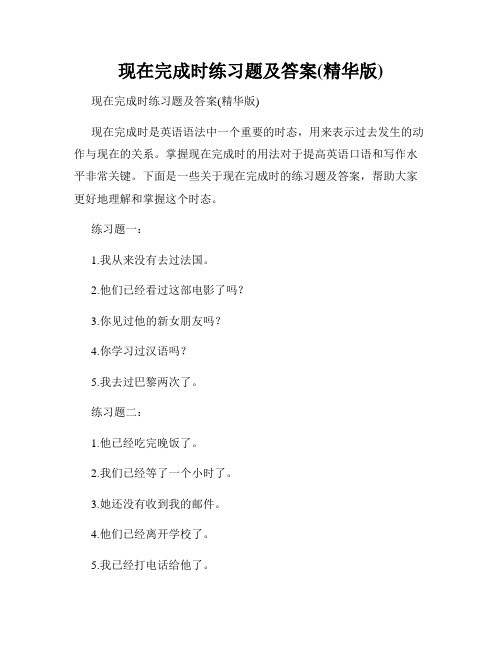
现在完成时练习题及答案(精华版)现在完成时练习题及答案(精华版)现在完成时是英语语法中一个重要的时态,用来表示过去发生的动作与现在的关系。
掌握现在完成时的用法对于提高英语口语和写作水平非常关键。
下面是一些关于现在完成时的练习题及答案,帮助大家更好地理解和掌握这个时态。
练习题一:1.我从来没有去过法国。
2.他们已经看过这部电影了吗?3.你见过他的新女朋友吗?4.你学习过汉语吗?5.我去过巴黎两次了。
练习题二:1.他已经吃完晚饭了。
2.我们已经等了一个小时了。
3.她还没有收到我的邮件。
4.他们已经离开学校了。
5.我已经打电话给他了。
练习题三:1.我已经做完作业了。
2.你刚才说过这个笑话了吗?3.他们已经买好了礼物。
4.我已经读完这本书了。
5.你已经看过这个电影了吗?练习题四:1.他们已经结婚十年了。
2.我们还没有决定去哪里度假。
3.她去过中国吗?4.你喝过咖啡吗?5.我已经完成了这个项目。
答案一:1. I have never been to France.2. Have they watched this movie?3. Have you seen his new girlfriend?4. Have you studied Chinese?5. I have been to Paris twice.答案二:1. He has finished dinner.2. We have been waiting for an hour.3. She hasn't received my email yet.4. They have left school.5. I have called him.答案三:1. I have finished my homework.2. Did you tell this joke just now?3. They have bought gifts.4. I have finished reading this book.5. Have you seen this movie?答案四:1. They have been married for ten years.2. We haven't decided where to go on vacation yet.3. Has she been to China?4. Have you ever drunk coffee?5. I have completed this project.。
【英语】英语现在完成时答题技巧及练习题(含答案)及解析

【英语】英语现在完成时答题技巧及练习题(含答案)及解析一、初中英语现在完成时1.——Where is Mr. Wang?——He together with his students ________ Zhuyuwan Park.A. has gone toB. have gone toC. has been toD. have been to【答案】 A【解析】【分析】句意:—王老师在哪里?—他同他的学生去了Zhuyuwan公园。
A. has gone to去了,没在这里。
主语是单数;B. have gone to去了,没在这里。
主语是复数;C. has been to去过,没在那里;主语是单数;D. have been to去过,没在那里;主语是复数。
本句He是主语,together with his students是介词短语,做定语不是主语,所以用has。
王老师去公园了不在这里,所以用has gone to。
故选A。
【点评】考查主谓一致和短语的用法。
2.The volunteers ________ a lot of help to the old and the young since 2010.A. offeredB. have offeredC. are offeringD. will offer【答案】 B【解析】【分析】考查时态.句意"自2010以来,志愿者们向老人和青年提供了大量的帮助.".A过去时.B现在完成时态.C现在进行时态.D一般将来时态.since+点时间通常用于现在完成时态,结构是have/has+动词的过去分词,主语是volunteers复数,用助动词have.offer的过去分词是offered.答案是B.3.My father ____ in a panda protection center for 10 years, so he knows a lot about panda.A. was workingB. is workingC. has workedD. will work【答案】 C【解析】【分析】句意:我父亲在熊猫保护中心工作了10年,所以他对熊猫很了解。
现在完成时讲解(含讲解及习题)
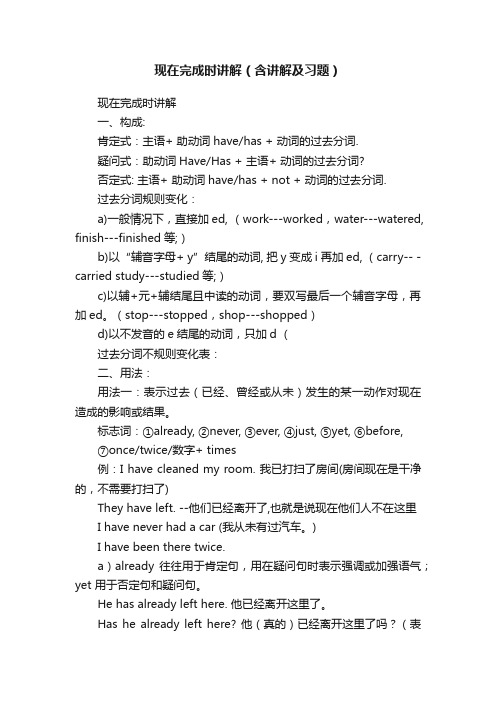
现在完成时讲解(含讲解及习题)现在完成时讲解一、构成:肯定式:主语+ 助动词have/has + 动词的过去分词.疑问式:助动词Have/Has + 主语+ 动词的过去分词?否定式: 主语+ 助动词have/has + not + 动词的过去分词.过去分词规则变化:a)一般情况下,直接加ed, (work---worked,water---watered, finish---finished等;)b)以“辅音字母+ y”结尾的动词, 把y 变成i 再加ed, (carry-- -carried study---studied等;)c)以辅+元+辅结尾且中读的动词,要双写最后一个辅音字母,再加ed。
(stop---stopped,shop---shopped)d)以不发音的e结尾的动词,只加d (过去分词不规则变化表:二、用法:用法一:表示过去(已经、曾经或从未)发生的某一动作对现在造成的影响或结果。
标志词:①already, ②never, ③ever, ④just, ⑤yet, ⑥before,⑦once/twice/数字+ times例:I have cleaned my room. 我已打扫了房间(房间现在是干净的,不需要打扫了)They have left. --他们已经离开了,也就是说现在他们人不在这里I have never had a car (我从未有过汽车。
)I have been there twice.a)already 往往用于肯定句,用在疑问句时表示强调或加强语气;yet 用于否定句和疑问句。
He has already left here. 他已经离开这里了。
Has he already left here? 他(真的)已经离开这里了吗?(表示加强语气)My teachers haven’t had breakfast yet. 我的老师们还没有吃早饭。
Have you written to your parents yet? 你已经给你父母写过信了吗?b)never 是否定词,表示“从来没有”,而ever 表示“曾经”We have never been to the Great Wall. 我们从来没有去过长城。
现在完成时讲解及专项练习
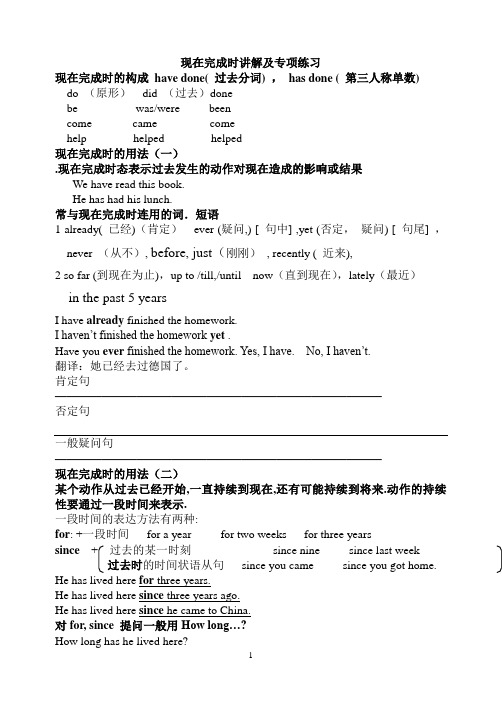
现在完成时讲解及专项练习现在完成时的构成have done( 过去分词) ,has done ( 第三人称单数)do (原形)did (过去)donebe was/were beencome came comehelp helped helped现在完成时的用法(一).现在完成时态表示过去发生的动作对现在造成的影响或结果We have read this book.He has had his lunch.常与现在完成时连用的词.短语1 already( 已经)(肯定)ever (疑问,) [ 句中] ,yet (否定,疑问) [ 句尾] ,never (从不), before, just(刚刚), recently ( 近来),2 so far (到现在为止),up to /till,/until now(直到现在),lately(最近)in the past 5 yearsI have already finished the homework.I haven’t finished the homework yet .Have you ever finished the homework. Yes, I have. No, I haven’t.翻译:她已经去过德国了。
肯定句————————————————————————————否定句一般疑问句————————————————————————————现在完成时的用法(二)某个动作从过去已经开始,一直持续到现在,还有可能持续到将来.动作的持续性要通过一段时间来表示.一段时间的表达方法有两种:for: +一段时间for a year for two weeks for three yearssince+ 过去的某一时刻since nine since last week过去时的时间状语从句since you came since you got home. He has lived here for three years.He has lived here since three years ago.He has lived here since he came to China.对for, since 提问一般用How long…?How long has he lived here?注意:for 和since 所引导的时间状语都表示一段时间.结束性动词( 瞬间动词)不能和表示一段时间的时间状语连用,但是他可以转换成相应的延续性动词.come/arrive --- go out --- leave ---begin ---- buy --- borrow ----join --- die --- catch a cold ---fall asleep--- close--- open---翻译:1 这本书他已经从图书馆借了两周了。
现在完成时用法,综合练习和答案
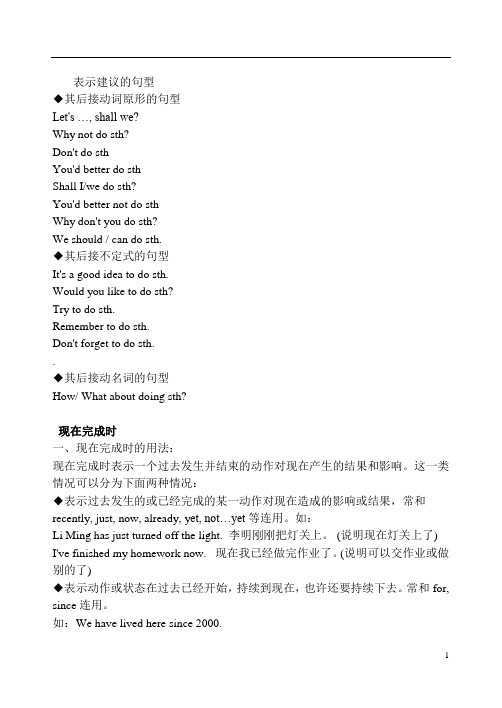
表示建议的句型◆其后接动词原形的句型Let's …, shall we?Why not do sth?Don't do sthYou'd better do sthShall I/we do sth?You'd better not do sthWhy don't you do sth?We should / can do sth.◆其后接不定式的句型It's a good idea to do sth.Would you like to do sth?Try to do sth.Remember to do sth.Don't forget to do sth..◆其后接动名词的句型How/ What about doing sth?现在完成时一、现在完成时的用法:现在完成时表示一个过去发生并结束的动作对现在产生的结果和影响。
这一类情况可以分为下面两种情况:◆表示过去发生的或已经完成的某一动作对现在造成的影响或结果,常和recently, just, now, already, y et, not…yet等连用。
如:Li Ming has just turned off the light. 李明刚刚把灯关上。
(说明现在灯关上了) I've finished my homework now. 现在我已经做完作业了。
(说明可以交作业或做别的了)◆表示动作或状态在过去已经开始,持续到现在,也许还要持续下去。
常和for, since连用。
如:We have lived here since 2000.二、基本结构:主语+have/has+动词的过去分词。
否定形式应在have/has后加not变为haven't/hasn't;疑问句应将have/has放在句子主语之前。
被动形式为:has/have been done。
如:I have read the book.I have not seen him before.This book has been returned to the library.三、现在完成时和一般过去时的区别现在完成时与一般过去时都表示在过去发生的动作,但现在完成时强调这一动作与现在的关系,如动作对现在产生的影响、结果等;而一般过去时则只表示过去的事实,不表示和现在的关系。
现在完成时讲解及练习(答案)

现在完成时讲解及练习(答案)初中英语主要时态系列(六)——现在完成时讲解及练习1现在完成时的基本结构肯定句:主语+have/has+动词的过去分词+其他否定句:主语+have/has+not+动词的过去分词+其他⼀般疑问句:Have/Has+主语+动词的过去分词+其他特殊疑问句:特殊疑问词+⼀般疑问句(have/has+主语+过去分词+其他)2现在完成时的⽤法1. 现在完成时⽤来表⽰过去已经完成的动作对现在造成影响或后果。
也就是说,动作或状态发⽣在过去但它的影响现在还存在,强调的是现在。
I have already posted the photo.我已经邮寄出了照⽚。
与此种⽤法连⽤的时间状语时⼀些模糊的过去时间状语,如already(肯定句句中), yet(否定句/疑问句句尾), just, before, recently,still, lately,never 等。
2. 现在完成时也可⽤来表⽰动作或状态发⽣在过去某⼀时刻,持续到现在并且有可能会继续持续下去。
He has lived here since 1978.⾃从1978年以来,他⼀直住在这⼉。
(动作起始于1978年,⼀直住到现在,可能还要继续住下去。
)此种⽤法常与for(+时间段),since(+时间点或过去时的句⼦)连⽤。
谓语动词必须是延续性动词。
有些瞬间动词可变为延续动词:go out----be out finish----be over open----be open die----be dead buy---have fall ill---be ill come back----be back catch a cold----have a cold3现在完成时常见考法对于现在完成时的考查,多以单选、句型转换或词语运⽤的形式考查学⽣在具体语境中灵活运⽤时态的能⼒。
在考试中,会让⼤家判断是否该⽤现在完成时,或者是考查“瞬间动词”不能与表⽰⼀段时间的状语连⽤”这⼀知识点。
现在完成时语法及练习
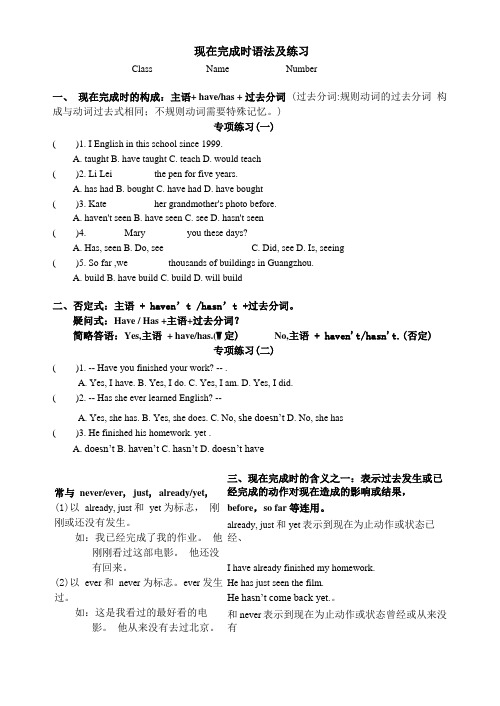
现在完成时语法及练习Class __________ Name __________ Number ___________一、 现在完成时的构成:主语+ have/has + 过去分词 (过去分词:规则动词的过去分词 构成与动词过去式相同;不规则动词需要特殊记忆。
)专项练习(一)()1. I English in this school since 1999. A. taught B. have taught C. teach D. would teach ()2. Li Lei _______ the pen for five years. A. has had B. bought C. have had D. have bought ()3. Kate ________ her grandmother's photo before. A. haven't seen B. have seen C. see D. hasn't seen ()4. ______ Mary _______ you these days? A. Has, seen B. Do, seeC. Did, seeD. Is, seeing ( )5. So far ,we _______ thousands of buildings in Guangzhou.A. buildB. have buildC. buildD. will build 二、否定式:主语 + haven’t /hasn’t +过去分词。
疑问式:Have / Has +主语+过去分词?简略答语:Yes,主语 + have/has.(W 定) No,主语 + haven't/hasn't.(否定)专项练习(二)()1. -- Have you finished your work? -- . A. Yes, I have. B. Yes, I do. C. Yes, I am. D. Yes, I did. ( )2. -- Has she ever learned English? --A. Yes, she has.B. Yes, she does.C. No, she doesn’tD. No, she has( )3. He finished his homework. yet .A. doesn’tB. haven’tC. hasn’tD. doesn’t have三、现在完成时的含义之一:表示过去发生或已经完成的动作对现在造成的影响或结果,before ,so far 等连用。
现在完成时讲解_50道现在完成时练习题(含答案)
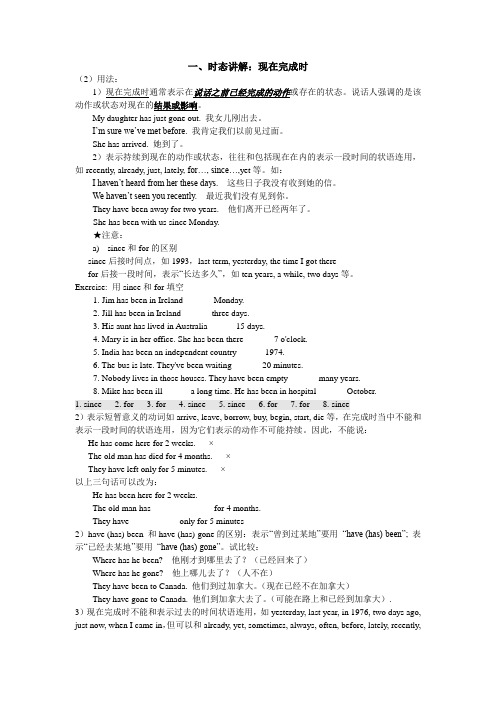
一、时态讲解:现在完成时(2)用法:1)现在完成时通常表示在说话之前已经完成的动作或存在的状态。
说话人强调的是该动作或状态对现在的结果或影响。
My daughter has just gone out. 我女儿刚出去。
I’m sure we’ve met before. 我肯定我们以前见过面。
She has arrived. 她到了。
2)表示持续到现在的动作或状态,往往和包括现在在内的表示一段时间的状语连用,如recently, already, just, lately, for…, since…,yet等。
如:I haven’t heard from her these days. 这些日子我没有收到她的信。
We haven’t seen you recently. 最近我们没有见到你。
They have been away for two years. 他们离开已经两年了。
She has been with us since Monday.★注意:a)since和for的区别since后接时间点,如1993,last term, yesterday, the time I got therefor后接一段时间,表示“长达多久”,如ten years, a while, two days等。
Exercise: 用since和for填空1. Jim has been in Ireland ______ Monday.2. Jill has been in Ireland ______ three days.3. His aunt has lived in Australia ______15 days.4. Mary is in her office. She has been there ______ 7 o'clock.5. India has been an independent country ______1974.6. The bus is late. They've been waiting ______ 20 minutes.7. Nobody lives in those houses. They have been empty ______ many years.8. Mike has been ill ______a long time. He has been in hospital ______ October.1. since2. for3. for4. since5. since6. for7. for8. since2)表示短暂意义的动词如arrive, leave, borrow, buy, begin, start, die等,在完成时当中不能和表示一段时间的状语连用,因为它们表示的动作不可能持续。
高考现在完成时的用法

高考英语现在完成时讲解与练习一、现在完成时的构成1.现在完成时结构:主语+助动词have(has)+动词过去分词否定句:have/has后加not,haven’t/hasn’t一般疑问句:前提have/has2.现在完成时的概念:1)表示过去发生的动作对现在造成的影响或结果。
--Have you had your lunch yet?你吃过午饭了吗?--Yes,I have.I have just had it.是的,我刚吃过。
(现在我不饿了。
)I have already posted the photos.我已经寄过这些照片。
(这些照片已不在我这里了。
)2)过去发生的事情,一直持续到现在(其谓语动词多是延续性动词或表示状态的词)。
I haven’t seen her these days.近来我一直没见过他。
I’ve known Li Lei for three years.我认识李雷已经三年了。
They have lived here since1996.他们自从1996年就住在这儿。
She has taught us since I came to this school.自从我来这所学校,她就教我。
3.现在完成时多与下列时间状语连用:1)用于“过去发生的事,对现在造成的影响或结果”的时间状语有:already(已经→肯定句)yet(还;尚未→否/疑问句)never(从未)ever(曾经→疑问句)just(刚刚)before(以前)2)用于“过去发生的事,一直延续到现在”的时间状语有:for+时间段(for two years)since two years agosince+时间点since2008since he came here.so far(目前;迄今为止)up to now=till now=by now到现在为止;直到现在by the end of this year到今年年末【by the end of…到…末/结束】by the end of this month到本月末during the last(past)few years在过去的几年中in the last(past)months在过去的几个月中all the time总是;一直recently最近these days近几天3.have(has)been和have(has)gone区分1)have/has gone(to)表示某人已经去了某地,人不在这儿。
(英语)英语现在完成时解题技巧及练习题及解析

(英语)英语现在完成时解题技巧及练习题及解析一、初中英语现在完成时1.My sister in America for two years.I miss her very much.A. studiesB. studiedC. has studiedD. is studying【答案】C【解析】【分析】句意:我的姐姐在美国学习了两年了。
现在进行时表示持续大现在的状态并有可能继续持续下去。
故C选项正确。
【点评】考查现在完成时。
2.I scared of dogs ever since a dog hurt me when I was five years old.A. will beB. wasC. have beenD. would be【答案】 C【解析】【分析】由since引导的从句可知主句应用现在完成时,故答案为C。
句意是:自从我五岁时被狗伤过之后我就一直怕狗。
【点评】本题考查现在完成时的用法。
3.—How do you like Treasure Island,Lucy?—It's so exciting that I _______ it twice.A. am readingB. have readC. was readingD. had read【答案】B【解析】【分析】句意:——露西,你认为《金银岛》怎么样?——它是如此令人激动以至于我读了两次。
根据twice可知已经发生了,故此处用现在完成时,故为have read,故选B。
【点评】此题考查现在完成时的用法。
4.— Where is your uncle? I haven't seen him for a long time.— He _______ Beijing for about half a year. He moved there in January.A. has gone toB. has been toC. has arrived inD. has been in【答案】 D【解析】【分析】考查延续与非延续性动词。
现在完成时态的讲解和练习题(6月5日)
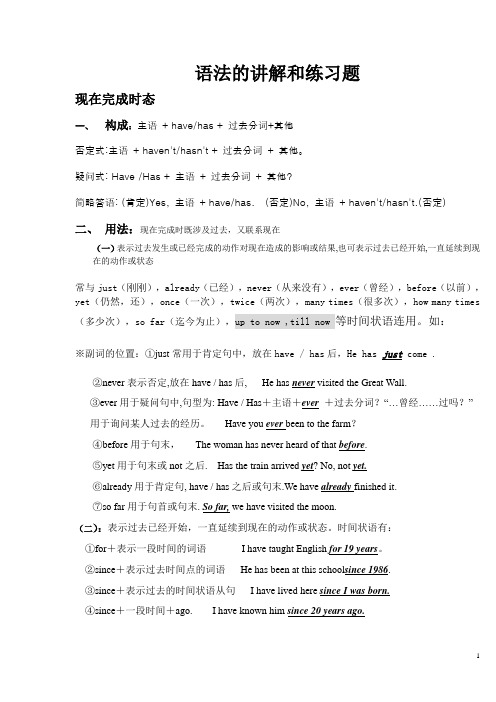
语法的讲解和练习题现在完成时态一、构成:主语+ have/has + 过去分词+其他否定式:主语+ haven't/hasn't + 过去分词+ 其他。
疑问式: Have /Has + 主语+ 过去分词+ 其他?简略答语: (肯定)Yes, 主语+ have/has. (否定)No, 主语+ haven't/hasn't.(否定)二、用法:现在完成时既涉及过去,又联系现在(一)表示过去发生或已经完成的动作对现在造成的影响或结果,也可表示过去已经开始,一直延续到现在的动作或状态常与just(刚刚),already(已经),never(从来没有),ever(曾经),before(以前),yet(仍然,还),once(一次),twice(两次),many times(很多次),how many times(多少次),so far(迄今为止),up to now ,till now 等时间状语连用。
如:※副词的位置:①just常用于肯定句中,放在have / has后,He has just come .②never表示否定,放在have / has后, He has never visited the Great Wall.③ever用于疑问句中,句型为: Have / Has+主语+ever+过去分词?“…曾经……过吗?”用于询问某人过去的经历。
Have you ever been to the farm?④before用于句末,The woman has never heard of that before.⑤yet用于句末或not之后. Has the train arrived yet? No, not yet.⑥already用于肯定句, have / has之后或句末.We have already finished it.⑦so far用于句首或句末. So far, we have visited the moon.(二):表示过去已经开始,一直延续到现在的动作或状态。
英语现在完成时态详解及专项练习

英语现在完成时态详解及专项练习现在完成时态详解:一.基本结构:助动词have/has+过去分词(done)二.句型:否定句:主语+have/has+not+过去分词+其他.一般疑问句:Have/Has+主语+过去分词+其他.简略答语: Yes, 主语 + have/has.(肯定)No, 主语 + haven't/hasn't.(否定)三.用法:(1)现在完成时表示过去发生或已经完成的动作对现在造成的影响或结果I have spent all of my money (so far).(含义是:现在我没有钱花了.)Guo zijun has (just/already) e. (含义:郭子君现在在这儿)My father has gone to work.(含义是:我爸爸现在不在这儿)(2)现在完成时可以用来表示发生在过去某一时刻的,持续到现在的动作(用行为动词表示)或状态(be动词表示)常与for(+时间段),since(+时间点或过去时的句子)连用.①for+时段②since+过去一个时间点(译为:自从……以来)③since+时段+ago④since+从句(过去时)⑤It is+时段+since+从句(过去时)Mary has been ill for three days.I have lived here since 1998.四.has gone (to),has been (to), has been (in) 的区别Have/Has gone(to) :去了(现在不在说话现场)Where is your father?He has gone to Shanghai.Have/Has been (to) :去过(已不在去过的地方)My father has been to Shanghai.Have/has been in:呆了多久(还在所呆的地方)My father has been in Shanghai for two months. /since two months ago.五.现在完成时的标志:1. 现在完成时的含义之一是过去完成的动作对现在仍有影响,用以下四大标志词可以表达这种含义:* 以already, just和yet为标志①He has already got her help.他已得到她的帮助。
英语现在完成时技巧和方法完整版及练习题含解析

英语现在完成时技巧和方法完整版及练习题含解析一、初中英语现在完成时1.—What about watching the movie Big Fish tomorrow?—Oh, I it already.A. watchB. have watchedC. will watchD. am watching【答案】 B【解析】【分析】明天去看电影大鱼怎么样?哦,我已经看过了。
already是完成时的标志,故选B。
【点评】联系句意,注意辨析关键的词语,来判断所填之词。
2.—What great progress Huawei ________ in recent years!—No wonder it is widely known in all parts of the world.A. is makingB. has madeC. makesD. made【答案】 B【解析】【分析】句意:——华为近几年取得了多大的进步啊!——难怪它在世界的每个角落都出名。
根据时间状语in recent years,近几年,可知动作从过去持续到现在,时态为现在完成时have/has+过去分词,故选B。
【点评】考查现在完成时。
注意掌握现在完成时的结构have/has+过去分词。
3.I am surprised at the new look of my hometown,for it _____ a lot over the years.A. changedB. changesC. will changeD. has changed【答案】 D【解析】【分析】我对我的家乡的新面貌感到惊讶,因为这几年改变了很多,结合over the years可知表达的动作发生在过去,对现在造成一定的影响,故用现在完成时have/has+过去分词,主语it,故has,故答案是D.4.I scared of dogs ever since a dog hurt me when I was five years old.A. will beB. wasC. have beenD. would be【答案】 C【解析】【分析】由since引导的从句可知主句应用现在完成时,故答案为C。
现在完成时的用法及练习题

现在完成时的用法及练习题Modified by JEEP on December 26th, 2020.现在完成时的用法1.定义:现在完成时是由助动词 have(has)+动词的过去分词构成。
助动词说明该谓语是属于现在时范围。
它和主语的人称、数要保持一致。
过去分词是主要的谓语动词,说明句子的意2.用法(1)表示动作发生在过去某个不确定的时间,但对现在留下了某种影响和结果。
常被just、already、yet 等副词修饰。
-Haveyouhadlunchyet-Yes,Ihave.I’vejusthadit.你(已经)吃午饭了吗我刚刚吃过。
(现在我不饿了)(2)表示从过去某一时刻开始一直持续到现在的动作或状态。
这个动作可能刚停止,可能仍然在进行。
常带有for和since等表示一段时间的状语。
①.Hehastaughtheresince1981 他自1981年就在这儿教书。
(可能还要继续教)②.Ihave’tseenherforfouryears.(3)表示说话前发生过一次或多次的动作,现在成为一种经验,一般译为汉语“过”,常带有twice,ever,never,three times等时间状语。
IhavebeentoBeijingtwice.3.现在完成时的时间状语(1)现在完成时属于现在时范围,故不能和过去的时间状语连用。
如:yesterday,last Sunday,in1990,three years ago等。
但是,在强调动作产生的后果和影响时,可以和一些表示不确定的时间状语连用。
a.用副词already和yet。
already一般用于肯定句中,yet一般用于否定句和疑问句中。
如:Wehavealreadyfinishedourhomework.我们已完成作业了。
Theyhaven’tfinishedtheirhomeworkyet.他们还没有完成作业。
b.用ever和never。
多用于否定或疑问句中,表示“曾经”或“从未“等。
现在完成时考点与练习

现在完成时考点与练习考点一:考查基本概念例Both his parents look sad .Maybe they______what's happened to him .A.knew B.have known C. must know D.will know简析:现在完成时主要强调过去发生的动作对现在造成的影响,或过去发生的动作还未结束,一直持续到现在或将来,重点在于对现在的影响。
这种考查难度较大,往往无时间状语,需要从上下文分析、推理才行。
故上两侧根据上下文分析、推理,正确答案是B。
考点二:考查时间状语例1. He has _______ been to Shanghai , has he ?A.already B.never C.ever D. still例2. Have you met Mr Li ______?A.just B.ago C.before D.a moment ago例3.The famous writer _____ one new book in the pasttwo year .A.is writing B.was writing C.wroteD.has written例4.—Our country ______ a lot so far .—Yes . I hope it will be even ______ .A.has changed;well B.changed;goodC.has changed; better D.changed;better例5.Zhao Lan ______already ______in this school fortwo years .A.was;studying B.will;studyC.has;studied D. are;studying例6.We ______ Xiao Li since she was a little girl.A.know B.had known C.have knownD. knew例7.Harry Potter is a very nice film.I______it twice .A.will seeB.have seenC.sawD.see简析:现在完成时的时间状语常有如下四类:⑴现在完成时常与already(已经)just(刚刚,正好)ever(曾经),never(从来,也不;从不)before(以前)yet(仍然)等连用。
现在完成时

现在完成时精讲及练习一、基本结构:主语+have/has+过去分词(done)①肯定句:主语+have/has+过去分词+其他②否定句:主语+have/has+not+过去分词+其他③一般疑问句:Have/Has+主语+过去分词+其他④特殊疑问句:特殊疑问词+一般疑问句(have/has+主语+过去分词+其他)二.动词过去分词规则变化:①+ed. Played ②以不发音e结尾+d. skated③辅音字母+y结尾改y为i + ed. studied④双写最后一字母+ed. stopped ,preferred不规则变化:练习:把下列动词变成过去分词:work want look seelisten jump steal govisit live move tastehope study copy carrytake stop trip readhave do finish borrowbuy三、用法现在完成时主要有两种用法,1.影响性用法:表示过去发生或已完成的动作对现在造成的影响,强调的是影响。
①这个动作在过去已经完成②这个动作对现在有影响,③常与already, yet(用于否定和疑问句),ever, never,the (last/past) few (years/days),before,just等连用。
Eg. I have already read this story.(对现在的影响或结果:我已经知道故事的内容)----Have you had lunch yet? ----Yes, I have. I've just had it.你(已经)吃午饭了吗?我刚刚吃过。
(现在我不饿了)He has never driven a car before. 他过去从未开过车。
Our hometown has changed a lot in the past few years. 我们家乡在过去的几年里变化很大。
英语现在完成时专项讲解及练习

现在完成时专项(一)现在完成时:一.现在完成时的用法(1)表示过去发生或已经完成的动作对现在造成的影响或结果。
常和just(刚刚),already(已经) ,yet(已经) ,never(从不),ever(曾经),before(以前),so far(到目前为止)等时间状语连用。
- Have you had breakfast yet?你吃过早饭了吗?一Yes,I have. I've just had it.是的,我吃过了。
我刚吃过。
(现在我不饿了)I've already read the book.我已经读过这本书了。
(了解了书的内容)(2)表示从过去某一时刻开始一直持续到现在的动作或状态,还有可能继续下去,常和for或since引导的时间状语连用。
此时的谓语动词必须是延续性动词。
They have lived here for twenty years.他们在这里住了20年了。
(还可能继续住下去)We' ve lived here since 2006.从2006年开始我们便住在这里。
二、构成“助动词have (has)+动词过去分词”构成现在完成时。
主语为第三人称单数时用has,其余人称用have。
三、句型结构如:He has taken down the wall.他已经把那面墙拆了。
He hasn't taken down the wall.他还没拆除那面墙。
-Has he taken down the wall?他拆除那面墙了吗?-Yes, he has./No, he hasn't.是的,他拆了。
/不,他没拆。
What has the boy given to his friend?男孩给了他朋友什么?Who has finished homework?谁完成作业了?四、动词过去分词的变化规则规则动词的过去分词的构成与过去式的构成相同。
不规则动词的过去分词须特殊记忆。
现在完成时讲解和练习(有答案)
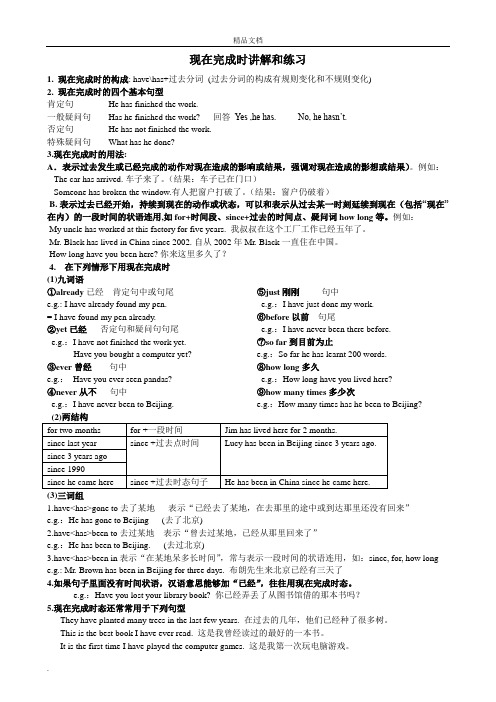
现在完成时讲解和练习1. 现在完成时的构成: have\has+过去分词(过去分词的构成有规则变化和不规则变化)2. 现在完成时的四个基本句型肯定句He has finished the work.一般疑问句Has he finished the work? 回答Yes ,he has. No, he hasn’t.否定句He has not finished the work.特殊疑问句What has he done?3.现在完成时的用法:A.表示过去发生或已经完成的动作对现在造成的影响或结果,强调对现在造成的影想或结果)。
例如:The car has arrived. 车子来了。
(结果:车子已在门口)Someone has broken the window.有人把窗户打破了。
(结果:窗户仍破着)B. 表示过去已经开始,持续到现在的动作或状态,可以和表示从过去某一时刻延续到现在(包括“现在”在内)的一段时间的状语连用,如for+时间段、since+过去的时间点、疑问词how long等。
例如:My uncle has worked at this factory for five years. 我叔叔在这个工厂工作已经五年了。
Mr. Black has lived in China since 2002. 自从2002年Mr. Black 一直住在中国。
How long have you been here? 你来这里多久了?4. 在下列情形下用现在完成时(1)九词语①already已经肯定句中或句尾e.g.: I have already found my pen.= I have found my pen already.②yet已经否定句和疑问句句尾e.g.:I have not finished the work yet.Have you bought a computer yet?③ever曾经句中e.g.:Have you ever seen pandas?④never从不句中e.g.:I have never been to Beijing. ⑤just刚刚句中e.g.:I have just done my work.⑥before以前句尾e.g.:I have never been there before.⑦so far到目前为止e.g.:So far he has learnt 200 words.⑧how long多久e.g.:How long have you lived here?⑨how many times多少次e.g.:How many times has he been to Beijing?(3)三词组1.have<has>gone to去了某地表示“已经去了某地,在去那里的途中或到达那里还没有回来”e.g.:He has gone to Beijing (去了北京)2.have<has>been to去过某地表示“曾去过某地,已经从那里回来了”e.g.:He has been to Beijing. (去过北京)3.have<has>been in 表示“在某地呆多长时间”,常与表示一段时间的状语连用,如:since, for, how longe.g.: Mr. Brown has been in Beijing for three days. 布朗先生来北京已经有三天了4.如果句子里面没有时间状语,汉语意思能够加“已经”,往往用现在完成时态。
现在完成时练习题108道(附答案)

现在完成时练习题108道现在完成时用于过去发生的动作或状态与现在的联系,包括对现在的影响、造成的结果以及动作的持续等。
现在完成时的形式是由“have/has + 过去分词”构成。
1.1 现在完成时的构成肯定句:主语+ have/has + 过去分词...否定句:主语+ have/has + not + 过去分词...疑问句:Have/Has + 主语+ 过去分词...?疑问代词/疑问副词+ have/has + 主语+ 过去分词...?肯定句否定句一般疑问句简答I / You have seen it I / You have not seen it Have you seen it? Yes, I have.No, I haven't.He / She / It has seen it He / She / It has not seenitHas he seen it ? Yes, he has.No, he hasn't.We / You / They have seen it. We / You / They havenot seen it.Have they seen it? Yes, they have.No, they haven't.1.2 现在完成时的肯定句句型:主语(第三人称单数以外的人称)+ have主语(第三人称单数)+ has +现在完成时的肯定句由助动词have/has加过去分词构成:He's gone shopping.他去买东西了。
I've never been to Paris.我从未到过巴黎。
1.3 现在完成时的否定句句型:主语+ have/has + not + 过去分词...现在完成时的否定句是在助动词have/has后加not,之后是过去分词:I haven't seen him for a long time.我已经很久没见到他了。
- 1、下载文档前请自行甄别文档内容的完整性,平台不提供额外的编辑、内容补充、找答案等附加服务。
- 2、"仅部分预览"的文档,不可在线预览部分如存在完整性等问题,可反馈申请退款(可完整预览的文档不适用该条件!)。
- 3、如文档侵犯您的权益,请联系客服反馈,我们会尽快为您处理(人工客服工作时间:9:00-18:30)。
现在完成时的用法1.定义:现在完成时是由助动词 have(has)+动词的过去分词构成。
助动词说明该谓语是属于现在时范围。
它和主语的人称、数要保持一致。
过去分词是主要的谓语动词,说明句子的意2.用法(1)表示动作发生在过去某个不确定的时间,但对现在留下了某种影响和结果。
常被just、already、yet 等副词修饰。
-Have you had lunch yet? -Yes,I have. I’ve just had it.你(已经)吃午饭了吗?我刚刚吃过。
(现在我不饿了)(2)表示从过去某一时刻开始一直持续到现在的动作或状态。
这个动作可能刚停止,可能仍然在进行。
常带有for 和since等表示一段时间的状语。
①.He has taught here since 1981他自1981年就在这儿教书。
(可能还要继续教)②. I have’t seen her for four years.(3)表示说话前发生过一次或多次的动作,现在成为一种经验,一般译为汉语“过”,常带有twice,ever,never,three times等时间状语。
I have been to Beijing twice.3.现在完成时的时间状语(1)现在完成时属于现在时范围,故不能和过去的时间状语连用。
如:yesterday,last Sunday,in1990,three years ago 等。
但是,在强调动作产生的后果和影响时,可以和一些表示不确定的时间状语连用。
a. 用副词already和yet。
already一般用于肯定句中,yet一般用于否定句和疑问句中。
如:We have already finished our homework.我们已完成作业了。
They haven’t finished their homework yet.他们还没有完成作业。
b.用ever 和never。
多用于否定或疑问句中,表示“曾经”或“从未“等。
如:-Have you ever been to the Great Wall?你曾经去过长城吗?-I have never been to the Great Wall.我从未去过长城。
c.用表示到说话为止的过去时间状语,如just,before,up to now,the past few years等。
例如:I have seen her before,but I can not remember where.我以前见过她,但记不起在哪里见过。
He has been there three times the last few days.近几年他去过那里三次了。
d.用包括“现在”在内的时间状语,如:now,today,this morning(month,year,term)等。
例如:-Have you met him today?-No,I haven’t.今天你见过他吗?我没有。
How many times have you been there this year?今年你去过那里多少次?(2)现在完成时可以和带有since或for等表示“一段时间”的状语连用,表示动作或状态从某一时刻开始,一直持续到现在。
如:I haven’t seen him for two years. 但是,像come,arrive,buy等终止性动词不能与表示“一段时间”的状语连用。
要用,必须改为“be(在)”等延续性动词来表述。
现归纳总结一下由非延续性动词到延续性动词的转换:arrive→be here begin(start)→be on die →be dead come back→be backleave →be away fall ill(sick,asleep)→be ill(sick,asleep) get up→be up go out →be outfinish →be over put on →wear或be on open →be open join →be in或 be a member of…close →be closed go to school→be a student borrow →keep buy →havecatch(a cold)→ have(a cold) get to know →know begin to study→study come to work→work①.He has been a soldier for three years. ②.His father has been dead for two years.③.The film has been on for ten minutes. ④.We have studied English for three years.4.现在完成时和一般过去时的区别现在完成时和一般过去时都表示在过去完成的动作。
但现在完成时强调的是这一动作与现在的关系。
如对现在产生的结果或影响等,而一般过去时只表示动作在过去某一时刻发生,不表示和现在的关系。
试比较:I have lost my new book. 我把新书丢了。
(现在还未找到)I lost my new book yesterday. 我昨天把新书丢了。
(昨天丢的,现在找到与否没说明)5.几点注意事项(1)have been(to)与have gone( to)的区别:have been(to)表示“去过某地(现在已经回来了)”,可用于各人称;have gone(to)表示“去某地了(说话时某人不在当地)”,常用于第三人称,前者可与once ,never,several times等连用,后者则不能。
①.They have been to Beijing twice.他们去过北京两次。
②.He has gone to Beijing . 他去北京了。
(2)如单纯表示一段时间,或强调一段时间,虽有since一词,也不必用完成时。
如:It is two years since his father died. =His father has been dead for two years.他父亲去世已有三年了。
(3)终止性动词现在完成时的否定式,已变成一种可以延续的状态,因此可以和表示一段时间的状语连用。
现在完成时练习题一、翻译下列句子:1. 你曾经吃过鱼和薯条吗?2. 我刚刚丢了我的化学书。
3. 我以前从来没去过那个农场。
4. 他已经吃过午饭了。
5. 你已经看过这部电影了吗?6. 我哥哥还没回来。
7. 我上星期看过这部电影。
8. 在1992年他住在这里。
9.这本字典我已买了三年了。
10.他离开中国三年了。
11.我认识他们五年了。
12.他们已去了美国五年了。
13.自从他搬到福州,他就住这儿了。
14.他们已经结婚10年。
15.我妹妹成为一个大学生已经三年。
16.这会已开了多长时间了?17.这门已经关了两天了。
18.我入团2年了。
I __________ ___________ ___________ two years ago.I __________ ___________ a ___________ ___________ for two years.I _________ _________ a ___________ of __________ _________ for two years.I __________ ___________ ____________ the __________ for two years.19.自从1999年以来他们就认识。
20.我来到农场已5年了。
二、用过去时或现在完成时填空:1. “_________ you __________ (have) lunch ?” “Yes.”“When ________ you __________ (have) it?”“I ____________ (have) it at 12:00.”2. “_________ you __________ (write) a letter to your aunt yet?”“Yes, I ___________. I ________________ (write) one last week.”3. “_________ he ___________ (finish) his homework?” “Not yet.”4. “_________ they ever __________ (be) abroad?” “Yes, just once.”5. Your father _________ just ___________ (finish) his work.6. Your father _________ (finish) his work just now.7. Last term I __________ (learn) many English words.8. They ____________ (not read) the interesting books yet.9. He _____________ never ____________ (go) to the science museum.10. ____________ you ever ____________ (drink) coke?11. “____________ you _____________ (buy) a dictionary? “ “Yes, I __________ .”“Where __________ you _____________ (buy) it?” “ I ___________ (buy) it in a bookstore.”“When ___________ you _____________ (buy) it?” “ Yesterday.”三、用since和for填空1. ______ two years2._______ two years ago3. _______ last month4.______ 19995._______ yesterday6. _______ 4 o’clock7. ______ 4 hours8._______ an hour ago9. _______ we were children 10. _____ lunch time 11.______ she left here12. He has lived in Nanjing ________ the year before last.13. I’ve known him __________ we were children.14. Our teacher has studied Japanese _________ three years.15. She has been away from the city ___________ about ten years.16. It’s about ten years __________ she left the city.四、短暂性动词转换为延续性动词①arrive at/in sw. get to/reach sw. come/go/move to sw.→be in sw./at school/at home/on the farm/be here/be there1) He got to Beijing five minutes ago.He ________ _________ _________ Beijing for _________ _________.2) I moved to the USA last year.I ________ ________ __________ the USA since __________ __________.3) I went home yesterday.I _______ ________ _________ home for _________ __________.4) They came here last week.They _________ _________ here since _________ __________.②come/go back, return →be back come/go out →be out1) He came out two years ago.He _________ __________ _________ for __________ __________.2) We return to Fuzhou yesterday.We ________ ________ _________ to Fuzhou since __________.③become →be1) I became a teacher in 2000.I ________ __________ a teacher for _________ _________.2) The river became dirty last year.The river _________ _________ dirty for _________ __________.④close →be closed open →be open1) The shop closed two hours ago.The shop ________ _________ _________ for _________ _________.2) The door opened at six in the morning.The door ________ ________ ________ for six hours.⑤get up →be up;die →be dead;leave sw. →be away from sw. fall asleep/get tot sleep →be asleep;finish/end →be over;marry →be married;1) I got up two hours ago.I ________ ________ ________ since ________ ________.2) He left Fuzhou just now.He _______ ________ ________ _________ Fuzhou for five minutes.3) My grandpa died in 2002.My grandpa _______ _______ ________for _______ ________.4) The meeting finished at six.The meeting ________ ______ ______ for six hours.5) I got to sleep two hours ago.I ________ _________ _________ since _________ _________.6) They married in 1990.They ________ _________ __________since _________.⑥start/begin to do sth. →do sth. ;begin →be on1) I began to teach at this school in 1995.I ____ ____ at this school since ____.2) The film began two minutes ago.The film ____ ____ ____ for ____ ____.⑦borrow →keep;lose →not have ;buy →have ;put on →wear catch/get a cold →have a cold;get to know →know1) They borrowed it last week.They _________ _________ it since __________ __________.2) I bought a pen two hours ago.I _________ _________ a pen for ________ __________.3) I got to know him last year.I _______ _______ him since __________ __________.4) I put on my glasses three years ago.I __________ __________ my glasses for _________ _________.⑧have/has gone to →have been inHe has gone to Beijing.He ____ ____ _____ Beijing for two days.⑨join the league/the Party/the army→be a league/a Party member/a soldier→be a member of the league/the Party→be in the league/the Party/the army1) He joined the league in 2002.He ________ _________ a _________ _________ for two years.He _______ _________ a __________ ___________ the __________ for two years.He ____________ ___________ ___________ the league for two years.2) My brother joined the army two years ago.My brother ________ __________ a ___________ for ___________ ___________.My brother __________ ___________ in ____________ ___________ for two years.划线提问1) I have been there for two days.__________ _________ __________ you __________ __________ ?2) My father has lived here since 2000._________ _________ __________ your father _________ __________?3) He left here yesterday._________ ________ he _________ __________?4) They bought a book two hours ago.__________ ___________ they __________ a book六、用have(has) been 或have(has) gone 填空。
